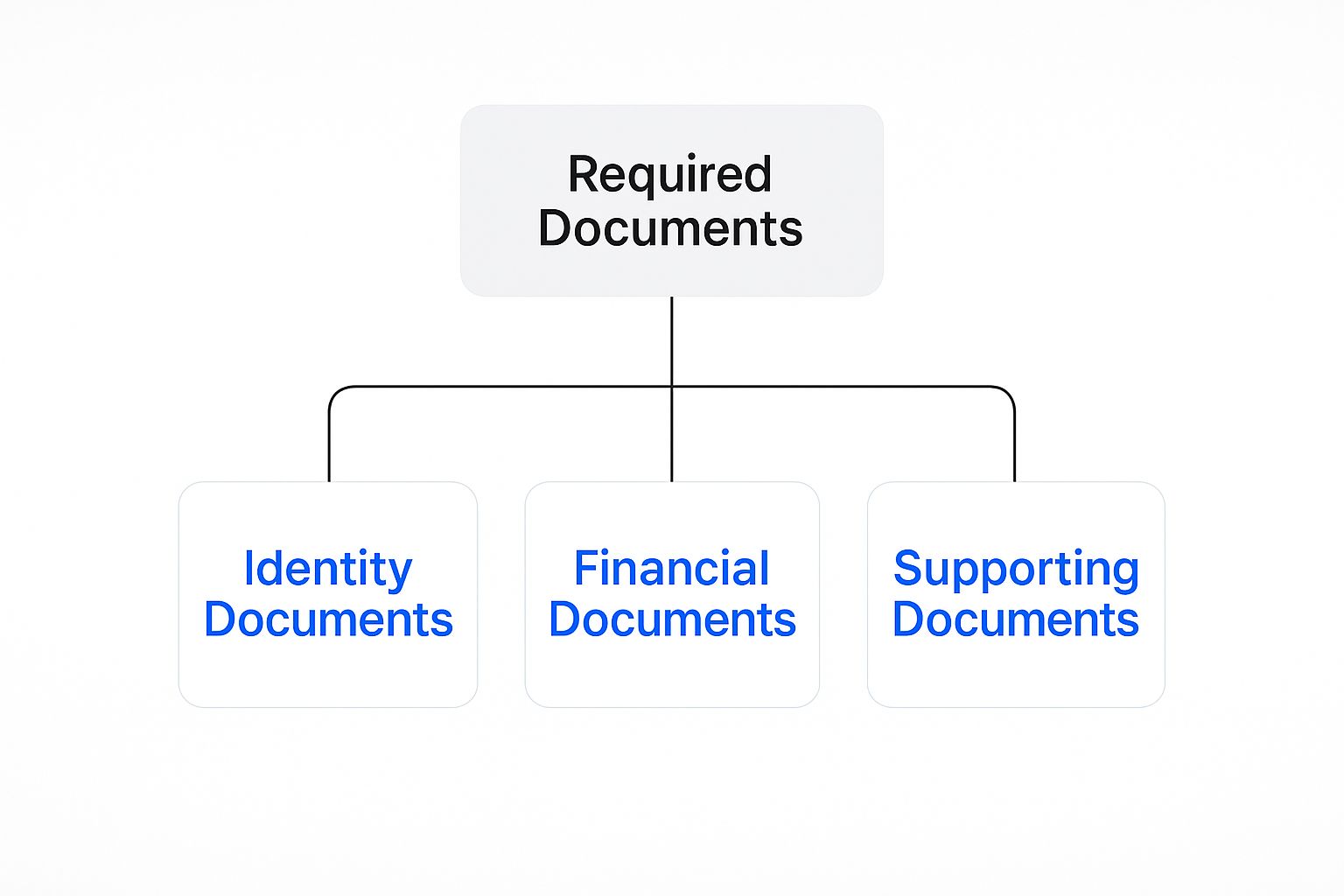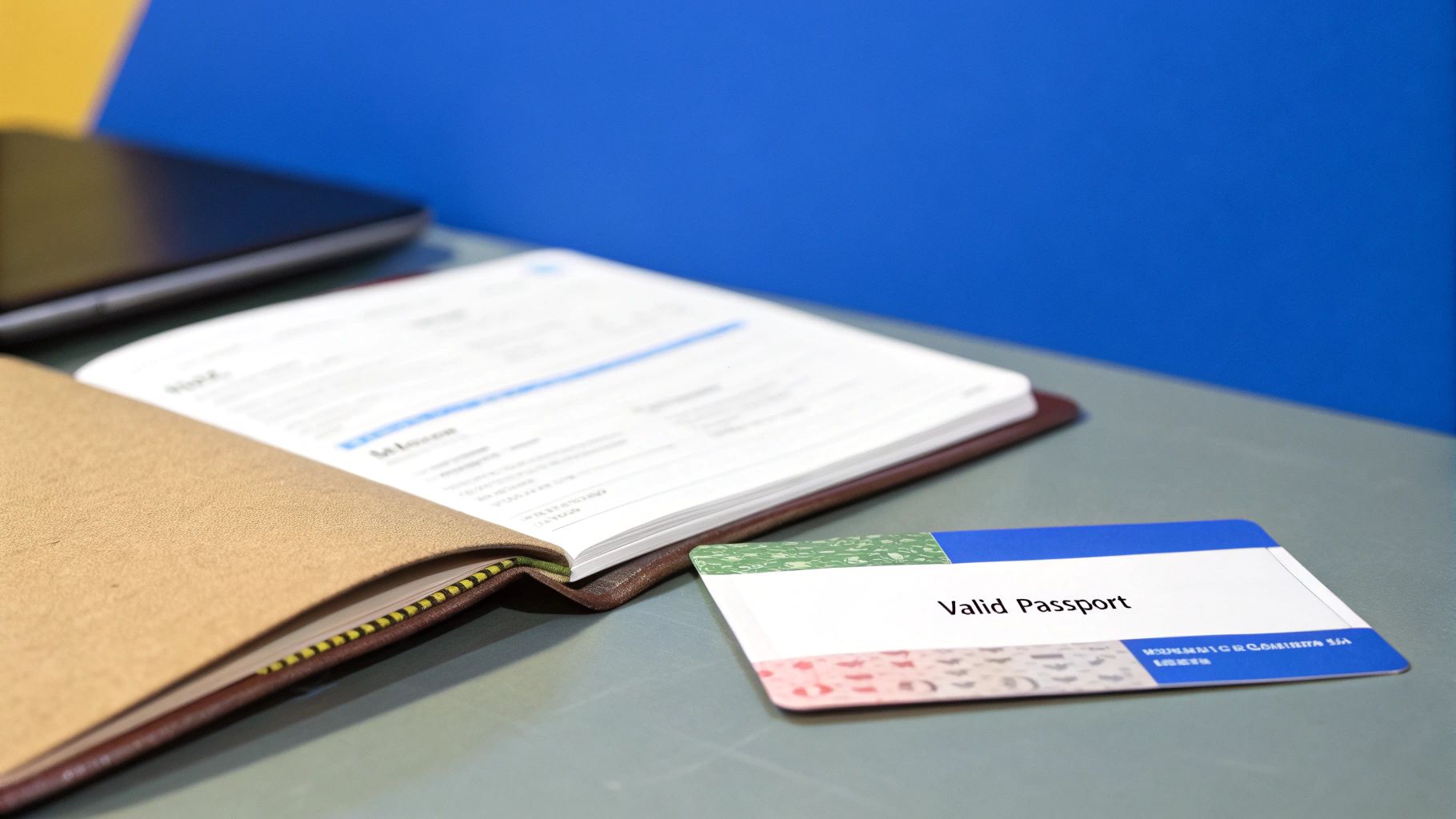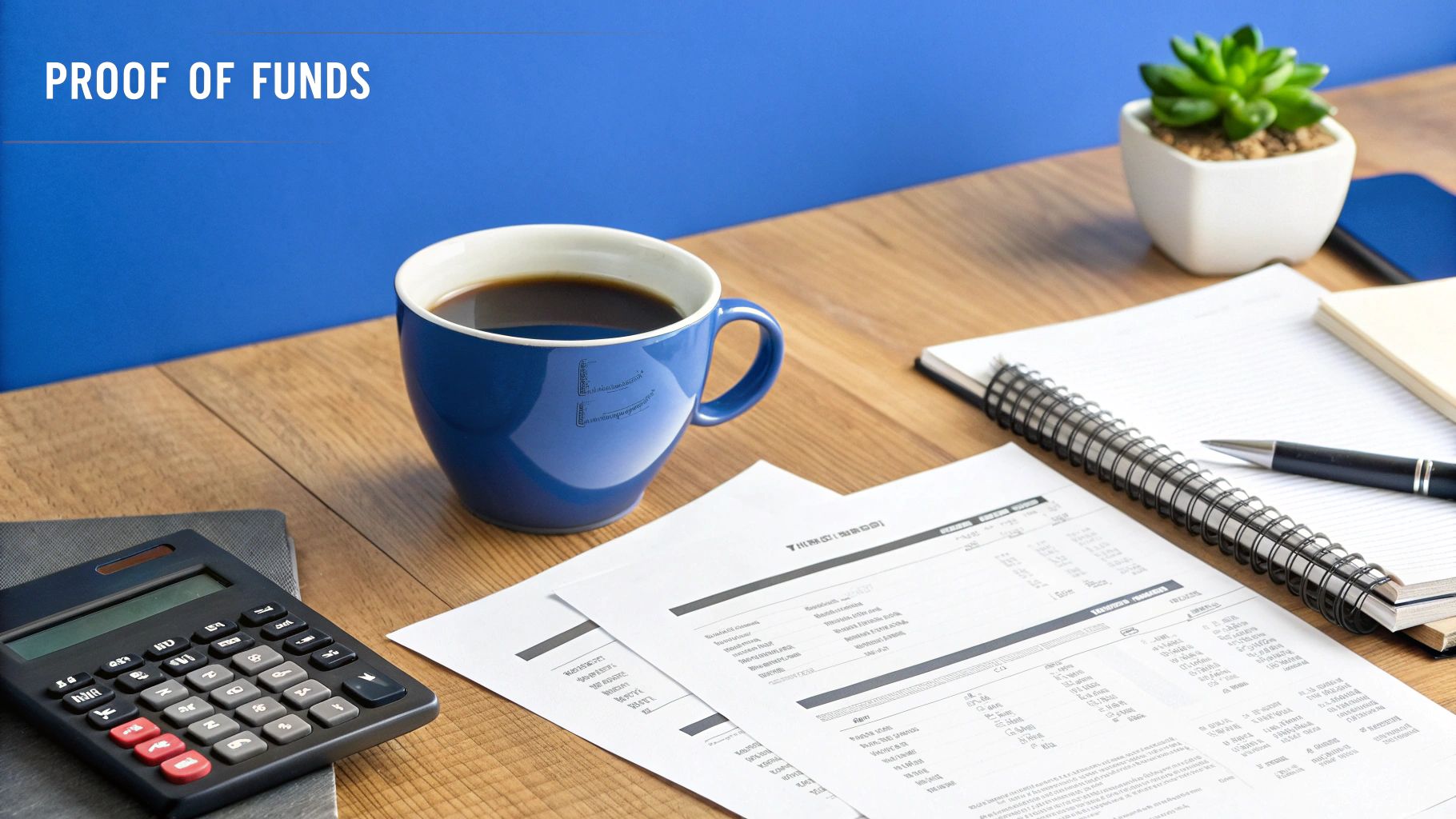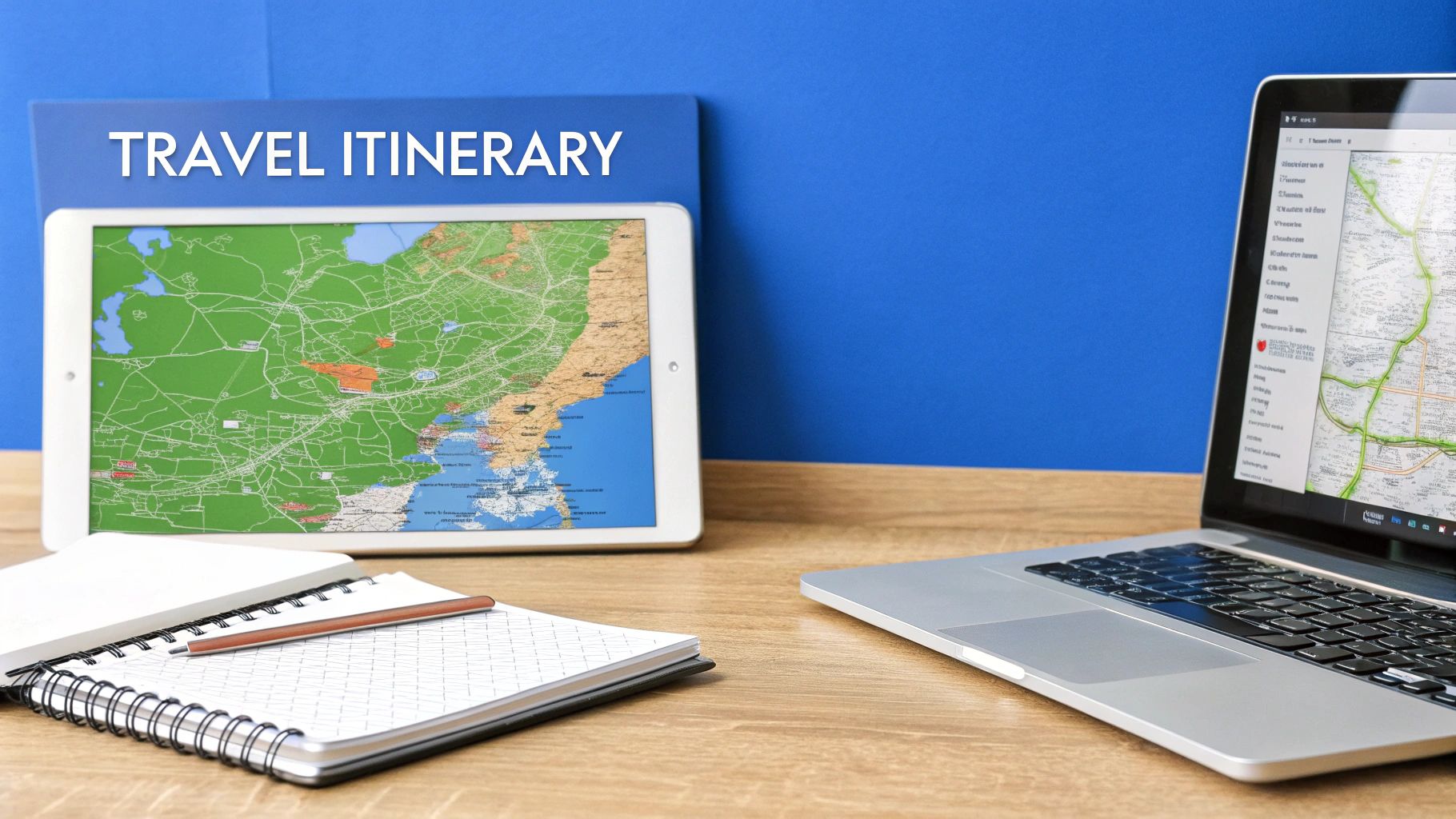UK Visitor Visa Documents: A Nigerian’s Guide to Getting It Right

When you're applying for a UK visitor visa from Nigeria, think of your application as telling a story to the visa officer in Abuja or Lagos. Every document you provide—from your Nigerian international passport to your bank statements and proof of your life back home—is a chapter in that story. Your goal is to make that story clear, believable, and compelling.
Your Essential UK Visa Document Checklist
Getting your paperwork in order is, without a doubt, the most critical part of the entire UK visitor visa process. This isn't just about ticking boxes on a list. It's about building a solid case for yourself, proving that you are a genuine visitor who fully intends to play by the rules and return home after your trip.
Each document serves a specific purpose, and together, they should paint a picture of a trustworthy applicant. For Nigerians, this boils down to providing rock-solid proof in three key areas: who you are, how you'll fund your trip, and the strong connections you have to Nigeria. One missing piece or a single confusing document can raise red flags and unfortunately lead to a visa refusal.
Breaking Down the Document Categories
To keep things organised, it's best to think of your documents in distinct categories. The main pillars of your application are your identity, your finances, and your ties to home.

This simple structure helps you focus your efforts, making sure you don't overlook anything important, from proving your identity to demonstrating you have a stable life waiting for you in Nigeria.
The British High Commission consistently sees applications fail because of weak or incomplete paperwork. In fact, a huge number of refusals are because applicants simply don't do a good enough job of proving their financial and social ties to Nigeria. This really hammers home how crucial it is to get your documents right from the start. We dive deeper into this in our full guide on the UK visa requirements for Nigerian citizens.
To help you get started, here's a quick look at the absolute must-have documents every Nigerian applicant needs to prepare.
Core Documents At a Glance
| Document Type | What It Proves to the Visa Officer |
|---|---|
| Valid Nigerian Passport | Your identity, nationality, and legal right to travel. |
| Bank Statements (6 months) | Your financial stability and ability to fund your trip without working in the UK. |
| Proof of Employment/Business | You have a stable job or business to return to in Nigeria (your "home ties"). |
| Evidence of Accommodation | Where you will stay in the UK, showing your visit is well-planned. |
| Travel Itinerary | The purpose and plan for your visit, proving you are a genuine tourist. |
Remember, this table covers the non-negotiables. Depending on your personal circumstances, you may need to provide additional supporting evidence to make your case even stronger.
A successful application tells a consistent story. Your employment letter, bank statements, and travel itinerary should all align, painting a picture of a credible visitor, not an aspiring immigrant.
For example, if you run a business in Lagos, your Corporate Affairs Commission (CAC) registration documents and business bank statements are essential. If you’re an employee in Abuja, your payslips and a formal letter from your employer granting you leave are non-negotiable. The UK government's own guidance shows that a shocking number of Nigerian applications are rejected each year because of these very issues. Getting the documentation right is your best strategy for success.
Getting Your Finances in Order for the UK Visa

Let's be honest, this is the part of the application that trips up most people. The Home Office isn't just looking for a fat bank account. What they're really after is a clear, consistent financial story that proves two things: you can genuinely afford this trip, and your money is legitimate.
A classic mistake we see all the time is 'funds parking'. This is when a huge, unexplained sum of money suddenly appears in an account right before an application. To a visa officer, this screams "borrowed money!" and is a massive red flag. They want to see a stable financial history, not a frantic, last-minute cash injection.
Think of your bank statement as your financial CV. It needs to tell a story of regular income and sensible spending over a decent period.
What Visa Officers Scrutinise on Your Bank Statements
The magic word here is stability. It doesn’t matter if you’re a salaried professional in Abuja or a business owner in Lagos; the goal is to paint a credible financial picture. When you're ready to pull these together, make sure you know how to download your bank statements quickly and easily and securely.
Here’s exactly what they’re looking for:
- A Six-Month History: You’ll need to provide personal bank statements covering the last six months. These can't be simple printouts; they must be the official copies, stamped and signed by your bank on every single page.
- Matching Salary Deposits: If you're employed, your monthly salary should pop up on your statement like clockwork. Crucially, the amount deposited must match what’s on your payslips. Any difference, no matter how small, creates doubt.
- A Sensible Closing Balance: There's no official "magic number," but the money left in your account needs to comfortably cover your flights, hotel, and spending money without leaving you with zero.
Picture this: a sudden deposit of ₦5 million lands in your account a week before you apply. On its own, that looks highly suspicious. But, if you also provide a sales agreement showing you just sold a car, along with proof of ownership transfer, you've explained the transaction. It's now a legitimate part of your financial story.
Matching Your Financial Proof to Your Job
How you prove your finances depends entirely on how you earn a living. You need to provide documents that make sense for your specific situation.
For Salaried Professionals:
- Your Employment Letter: This needs to be an official letter from your HR department. It must confirm your job title, your annual salary, and, importantly, that your leave for the trip has been approved.
- Recent Payslips: You'll need at least six months of official payslips. These are used to cross-reference the salary payments hitting your bank account.
For Business Owners:
- Business Registration: Your Certificate of Incorporation from the Corporate Affairs Commission (CAC) is non-negotiable.
- Business Bank Statements: Provide six months of statements from your business account. This shows the visa officer that your company is active and has a healthy turnover.
- Tax Clearance Certificate: This is your proof that the business is above board and compliant with Nigerian law.
What if someone else is paying for your trip? If a family member is sponsoring you, you must include their financial documents, a copy of their passport data page, and a signed letter from them. This sponsorship letter must clearly state their relationship to you and explicitly promise to cover all your expenses during your stay. Getting this financial part right is absolutely vital.
Demonstrating Unbreakable Ties to Nigeria

Right, so you've shown you have the funds for your trip. Now comes the biggest hurdle, and honestly, it’s the one that trips up most Nigerian applicants. The UK Home Office needs to be absolutely convinced of one thing: you will go back home to Nigeria after your visit.
Think of it from their perspective. They need to see that your life in Nigeria is too important, too established, and too valuable for you to simply walk away from. You need to build a compelling case with solid proof – what I call ‘anchor documents’ – that tie you firmly to your home country. A simple letter from your boss is a start, but on its own, it’s rarely enough.
Your entire application needs to scream "this is just a temporary visit." That means gathering documents that clearly show your significant responsibilities and deep connections waiting for you back in Nigeria.
Building Your Case with Anchor Documents
The goal here is to paint a vivid picture for the visa officer of your deep roots in Nigeria. These roots can be professional, financial, or personal. The more evidence you provide, and the stronger it is, the more they'll believe your intention to return is genuine.
Here are some of the most powerful anchor documents you can use:
- Employment Evidence: A letter from your employer is non-negotiable. It needs to specify your job title, your salary, and, crucially, the exact date you're expected to be back at your desk. This must be an officially approved leave of absence, not just a generic letter confirming you work there.
- Business Ownership: If you're an entrepreneur, your Corporate Affairs Commission (CAC) documents are your best friend. Get your certificate of incorporation ready, along with your business bank statements, to prove you have a real, operating business you need to get back to.
- Property Ownership: This is one of the heaviest anchors you can have. If you own land or a house, providing the title deed or deed of assignment is incredibly strong evidence of your ties.
Think of these documents as leaving a valuable 'deposit' behind in Nigeria. You're showing the visa officer that you have significant assets and responsibilities that you would never risk losing by overstaying your visa.
Proving Family and Social Ties
Work and money are important, but don't forget the human element. The Home Office is very interested in your family life. Evidence of dependents in Nigeria who rely on you is a massive point in your favour because it’s a powerful, emotional reason to return home.
Your family connections are a vital chapter of your story. Pull these documents together to show the full picture:
- Marriage Certificate: If you're married, this is a foundational document that establishes your life with your spouse in Nigeria.
- Children’s Birth Certificates: This is a big one. Including your children's birth certificates clearly demonstrates your parental duties and is a compelling indicator of your commitment to returning.
What if you don't own property yourself? You can still show strong residential ties. For example, if you live in the family home in Lagos, you can provide the property's title deed along with a letter from your parents confirming you reside there. If you can also add a few utility bills for that address in your name, you've just built a much stronger piece of evidence. This combination shows you have a stable home to come back to, which is a key part of the documents required for a UK visitor visa.
Crafting a Believable Purpose for Your Visit

So, you’ve sorted out your financial documents and shown your strong ties to Nigeria. What’s next? You need to paint a very clear picture of why you want to visit the UK. A vague, half-baked reason is one of the quickest ways to get a refusal. The visa officer needs to see a logical, credible plan that lines up perfectly with all the other documents you've submitted.
Think of it this way: your application is telling a story, and this section is the plot. It needs to be convincing and make sense from start to finish. You’re trying to show that you're a genuine visitor with a clear purpose, not someone trying to find a back door into the country.
Planning for a Tourist Visit
If you’re coming to the UK for tourism, nobody expects a military-style, minute-by-minute schedule. What they do want to see is that you've actually put some thought into your trip. A simple day-by-day itinerary is a brilliant way to show you have a genuine interest in being a tourist.
Your plan should be backed up with a few key things:
- Flight Reservations: Let's be clear: you do not need to buy your plane ticket before your visa is approved. A flight booking confirmation or reservation showing your intended travel dates is exactly what's needed.
- Hotel Bookings: The same logic applies here. Provide booking confirmations for your accommodation. Most hotel booking sites let you reserve a room without paying upfront, which is definitely the safest route to take.
- A Basic Itinerary: Simply outline what you plan to do. Something like, "Day 1-3: Explore London (visit Buckingham Palace, Tower of London). Day 4-5: Day trip to Manchester to see a football match," works perfectly.
This level of detail proves you're a serious applicant who has done their homework.
Documents for Visiting Family
Visiting family? In this case, the heart of your application is the invitation letter from your host in the UK. This isn’t just a quick note; it’s a critical piece of evidence among the documents required for a UK visitor visa.
The invitation letter has to be personal and specific. It must explain your relationship, why you’re visiting, how long you'll stay, and confirm where you'll be staying. A generic, copy-and-pasted letter will do more harm than good.
To make the invitation ironclad, your host in the UK needs to provide some documents of their own:
- A copy of their passport data page or their residence permit (for example, a Biometric Residence Permit) to prove they are legally in the UK.
- Proof they have space for you, like a tenancy agreement, mortgage statement, or council tax bill.
When you combine a heartfelt, personal invitation with official documents, you create a compelling and believable case for your visit. It gives the visa officer the confidence they need to see that your trip is genuine and well-supported.
Common Application Mistakes and How to Avoid Them
Learning from the mistakes others have made is your secret weapon in the UK visa application process. A lot of honest applicants from Nigeria get turned down, not because their intentions aren't genuine, but because of small, avoidable slip-ups that plant a seed of doubt in the visa officer’s mind. Getting this right is everything.
Knowing what these common pitfalls are ahead of time lets you be your own best critic. You can go through your documents with a fine-tooth comb and build a stronger case. The aim is simple: leave no room for questions or suspicion. Every single piece of paper should tell the same, consistent, and believable story.
Inconsistent Information Across Documents
This is probably the most frequent and damaging mistake we see. The visa officer is a detective; they will cross-reference every single document you submit. Even a minor inconsistency can cause your entire application to unravel.
Let's say your employment letter states your monthly salary is ₦350,000, but your bank statements consistently show deposits closer to ₦320,000. That's an instant red flag. The officer is going to wonder, "Why don't these numbers match?" and might start questioning if your job is even real.
- How to Avoid It: Before you even think about submitting, sit down with your payslips, employment letter, and bank statements spread out in front of you. Check that your salary figures, your full name, and your employer’s name are identical across the board. If there’s a good reason for a difference (like tax deductions), you must explain it clearly in your cover letter.
The Problem of 'Funds Parking'
Here’s another classic error: suddenly dumping a large sum of money into your bank account right before you apply. This is called "funds parking," and it’s a massive reason for visa refusal. To a visa officer, it looks like you've borrowed money just to make your account balance look good for the application.
Think about it from their perspective. You sell your Toyota Camry for ₦4 million and deposit the cash. With no explanation, that transaction looks incredibly suspicious.
- How to Avoid It: You have to prove where any large, out-of-the-ordinary deposits came from. In the car sale example, you’d need to provide the signed sales agreement, proof of ownership transfer, and maybe even a photo of the car. By doing this, you turn a potential red flag into solid proof of your financial situation. Transparency is always the best policy.
Your application must be a complete and honest reflection of your circumstances. Deliberately hiding information or providing misleading documents can be classed as deception, which carries severe consequences for future UK travel. You can learn more about the risks in our detailed article on visa application misrepresentation.
The UK Home Office looks at applications from Nigeria very closely. The numbers don't lie. According to recent reports, the refusal rate for Nigerian visitor visas can be over 50%. The vast majority of those refusals came down to weak financial evidence or failing to show strong ties back home. This just goes to show how critical it is to get these details right and avoid these common mistakes. You can dig into more of these official UK visa statistics yourself.
The Biometrics Appointment: The Final Hurdle in Nigeria
So, you’ve wrestled with the paperwork and gathered every last document. The final step before a visa officer even sees your application is the biometrics appointment. This is your in-person visit to a TLScontact visa application centre, either in Lagos or Abuja. It's a non-negotiable part of the process where they’ll take your fingerprints and a digital photograph.
Think of this appointment as the finish line of the application race. It's the moment you hand over all your hard work and officially submit everything for review.
What to Expect at the Visa Application Centre
The process inside the centre is usually quite straightforward. You'll arrive, have your appointment confirmed, and then wait to be called. An official will scan your fingerprints and take a digital photo of you. After that, your documents get their final check before being submitted.
The biggest change in recent years is the move to digital. You will almost certainly be asked to upload high-quality, clear scans of every single document. I can't stress this enough: a blurry, poorly scanned, or incomplete upload is a recipe for disaster. It can lead to serious delays or, even worse, an outright refusal.
Don't let a bad scan be the reason your application fails. Check that every page is perfectly readable, facing the right way up, and in the correct format. This one small detail can make all the difference to the outcome.
The Big Question: To Pay for Priority or Not?
Once you're at the centre, you’ll likely be offered a few optional add-on services. The most common one is the Priority Visa (PV) service, which promises a faster decision in exchange for a hefty fee.
So, is it worth it? That really boils down to how urgently you need to travel. If you’re trying to make a specific wedding date or an important business conference, paying the extra cost could be a smart move for your peace of mind. But if your travel dates are flexible, the standard service will get the job done just fine.
It's worth noting that the UK is constantly updating its border entry system, pushing for a more digital process. While a new Electronic Travel Authorisation (ETA) is being rolled out for some nationalities, Nigerians still need to go through the full Standard Visitor Visa application. This digital shift makes the accuracy of your submitted documents more critical than ever, especially when you consider that Nigerian visa centres have dealt with over 200,000 visa-related enquiries in a single year. You can find more details about the latest UK entry requirements on usembassy.gov.
Frequently Asked Questions
Going through the UK visa process can feel like a maze, and it’s natural to have questions. Let's tackle some of the most common ones we hear from Nigerian applicants to help you prepare your application with confidence.
How Much Money Do I Really Need for a UK Visa?
This is probably the number one question on everyone's mind. The truth is, there’s no official "magic number" that guarantees your visa will be approved. What visa officers are looking for is simple logic: can you comfortably afford your entire trip without it becoming a financial burden?
Think of it this way: the story your bank statement tells is far more important than the final balance. A steady history of income and savings over six months is much more powerful than a large, unexplained sum of money that suddenly appears right before you apply.
The goal is to show a healthy, stable balance that still has funds left over after you’ve deducted the estimated costs of your trip. This proves to the visa officer that you have financial stability and won't be left stranded.
Can I Use My Family’s House as Proof of Ties to Nigeria?
Yes, you certainly can, but the key is to prove your connection to the property beyond any doubt. If you live in a family-owned home, you’ll need to provide the property’s title deed or its Certificate of Occupancy.
On its own, that’s not enough. You also need a signed letter from the owner (perhaps your mother or father) confirming that you live there and have responsibilities tied to the home. To really strengthen this claim, include recent utility bills for that address that are in your name. This paints a clear picture of a stable home life in Nigeria that you intend to return to.
How Can I Prove My Income If I'm Paid in Cash?
This is a very common situation in Nigeria, but it requires careful and consistent documentation. Your best bet is to build a solid paper trail. The moment you receive your cash salary, deposit the exact amount into your bank account on that very same day. Do this every single month, without fail.
This routine needs to be backed up by official documents. Get an employment letter that clearly states your salary and confirms your payment method is cash. You must also provide official, signed payslips for at least the last six months. This consistency is what proves to the visa officer that your income is legitimate and reliable. Immigration policies can shift, so staying informed about changes discussed in things like the new UK immigration white paper is always a smart move.
Planning a move abroad has its challenges, but you don’t have to figure it all out by yourself. JapaChat is Nigeria's first AI immigration expert, built to provide instant, accurate answers to your visa and relocation questions. Start planning your journey with confidence today.

Leave a Reply